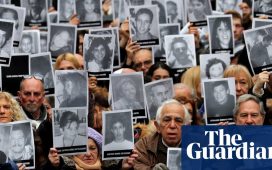To the Editor:
Re “We Need a Religious Left” (Op-Ed, Nov. 22):
Bianca Vivion Brooks fears that without the scaffolding of organized religion, the Democrats will progressively lose ground to religion-fueled right-wing extremism. She apparently doesn’t see the irony of wanting to mimic “the growing ideology of right-wing extremism, an ideology that has always been heavily undergirded by its own religious dogma.”
Religious fervor is precisely the problem with right-wing extremism, not the solution. The divinely inspired, self-righteous, rigid intolerance of religious zealots forecloses open-mindedness, compromise and acceptance.
Pitting religious dogmas against one another would only further erode what remains of our democracy. What both major parties need to foster open-mindedness, compromise and tolerance is less religion, not more.
Michael J. DeLaurentis
Elkins Park, Pa.
To the Editor:
Certainly, Catholicism deserves a place in any discussion of the religious left.
In this country, we have only to look to Dorothy Day, the founder of the Catholic Worker movement; the many priests and nuns who marched with the Rev. Dr. Martin Luther King Jr. in Selma; and the numerous statements of American bishops on progressive causes like economic equality, care for the environment, opposition to the death penalty, support for undocumented migrants and care for the poor and the disenfranchised.
Relatively little attention is paid to the many progressives who are faithful to Catholicism’s teachings and passionate about promoting social justice.
Let’s not forget that 48 percent of Catholics voted for Hillary Clinton in 2016, more than for Donald Trump, despite her pro-choice stance on abortion. Perhaps this is an indication not of any disagreement by Catholics with the church on the so-called hot-button issues, but rather of how important the social justice agenda is to many Catholics.
Richard J. Wolff
Hoboken, N.J.
Bread Loaf Writers Don’t Need Waiters
While a graduate student at the Vermont College of Fine Arts in Montpelier from 2007 to 2009, I never had to wait tables, and neither did my classmates. We all served ourselves, and faculty and students sat together in democratic collegiality, cafeteria-style.
This promoted wonderful conversations about writing and the arts, with no one feeling any sense of class division.
Betty J. Cotter
Shannock, R.I.





